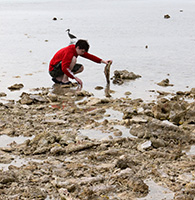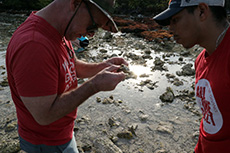SOUTH WATER CAYE, Belize -- Immersion trips always seem to present an explosion of information and sensory inputs when a class arrives on site.
It was no different for Dr. Eric Wetzel’s BIO 322 Invertebrate Biology course when the boat docked in Belize at the IZE Belize research station on March 5. Seven snorkeling excursions – four different ecosystems (sea grass, mangrove, reef, tidal pool) – with multiple exposures to the world’s second-longest barrier reef.
“There is no way we can work through the complexity here in an orderly way, so you might as well embrace the complexity of it,” said Wetzel. “There is all this crazy stuff going on. Let’s focus on the little stuff for a bit. They can hit the reef and see everything and see nothing. Getting them to slow down and look at something in depth, hopefully, allows them to see that better.”
 He taps the brakes for the students by having them choose their own research projects, do the research, analysis, and present to the class in the span of two or three days.
He taps the brakes for the students by having them choose their own research projects, do the research, analysis, and present to the class in the span of two or three days.
“I want them to engage in something they are interested in,” he continued. “The projects focus them on a singular thing dealing with invertebrates. Then they can extrapolate and say, ‘Oh, there are a million of those individual interactions.’ For me, that is the big benefit of the project.”
Joseph Miller ’25, a biochemistry major, did his research on a local Swimming Crab and how that species reacted to different habitats. He loved the scientific experience.
“You get to see different morphologies of a bunch of different genera,” he said. “This is one of the few places in the world where you could see a crazy amount of diversity. Three to five percent of known species are at the coral reefs. It is crazy being under the water at the reef with a massive amount of diversity.”
For chemistry major Adan Villeda ’23, much of this experience was brand new, and being able to lean on Wetzel and his classmates was helpful.
“Everything I did here was for the first time,” said the Chicago native. “The first times are so memorable. Having people around you who know what they are doing to guide you, made me feel more comfortable doing the science. Learning about invertebrates and marine biology has been a whole new world for me. This experience has been the best.”
So much of this immersion experience is getting familiar again with the joy of discovery and answering the questions  that interest you. And when those questions arise along a coral reef with so much happening right in front of your eyes, the answers don’t always come simply or directly.
that interest you. And when those questions arise along a coral reef with so much happening right in front of your eyes, the answers don’t always come simply or directly.
“That is a natural thing,” said Wetzel. “In some ways, it’s a recovery of the wonder and fascination of doing biology and asking questions. It’s almost a childlike wonder and amazement, and it ought to be. The students understand that there is a ton of variability in this. For them to be able to see that this isn’t clean or orderly is a benefit. There aren’t clean lines. That’s just life.”
Especially for Villeda, the project was challenging initially. But by using the scientific method and some helpful input from classmates, it turned into something positive.
“Being able to pursue something outside of the lab was very rewarding for me,” Villeda said. “Everything was new and to be able to run this project in just a few days, was memorable for me.
For Miller, the challenge was right at his fingertips.
"The biggest challenge in doing this project was not getting pinched by the crabs,” he joked. “Swimming Crabs like to pinch and it hurts a lot when they catch you.”